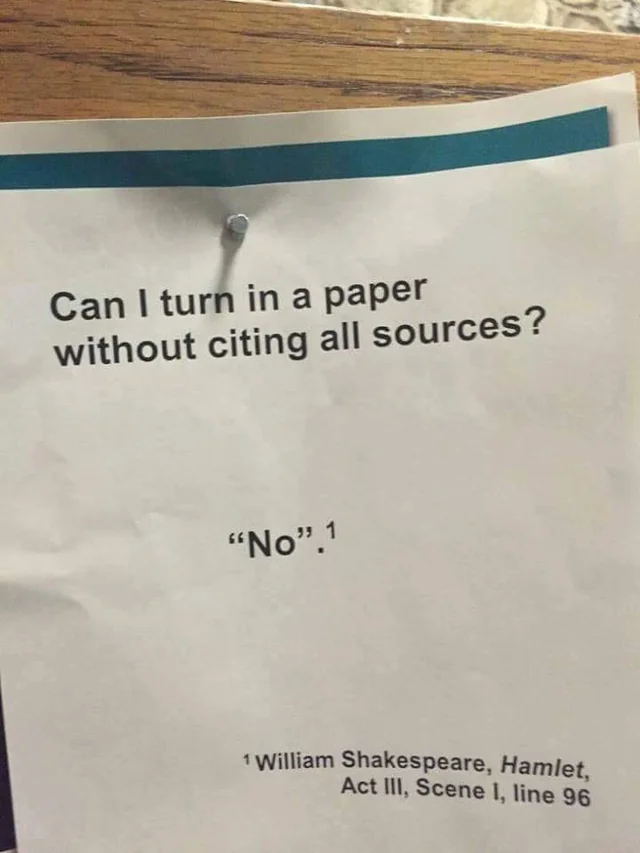Legal research is the first thing we’re exposed to as we begin our law school journey. Every law student who frequently works on legal research, articles, moot court memorials, or academic papers has understood the importance of proper citations.
From winning that moot to getting the best grade in University projects, the impact that well-structured references can have on credibility is indubitable.
However, as often as I have, do you struggle with citations or are unsure which style to use for your legal research? Do you frequently get confused between Bluebook, OSCOLA, and APA formatting?
Have you ever lost marks or credibility due to incorrect referencing? Do you spend more time formatting footnotes than focusing on your arguments? Do you wish there was an easier way to manage your citations? If your answer to any of the above questions is yes, this post is for you. Dive in to fully optimize your citation skills!
[Image from here.]
Why Know How to Cite Right?
First things first, why should you even know how to cite correctly? Here are a few reasons:
To not plagiarise!
If you take credit for someone else’s work, intentionally or not, you’re robbing them of their originality. As Shakespeare puts it in Othello, “He who filches from me my good name robs me of that which not enriches him and makes me poor indeed.”
In legal writing, failing to cite sources properly does the same thing. It diminishes your credibility while doing little to boost your argument. So give credit where it’s due. Your credibility and reputation depend on it.
To protect the credibility and accuracy of your work!
Citing the source ensures intellectual honesty and enhances your work’s credibility. Citing your sources shows that your work is backed by reliable information, strengthening your argument. Further, the better the source is cited, the stronger your argument will stand.
To get a Career Boost!
Good citations can help you get published at better places, which can be a game-changer for your career. Publications make you stand out, build your credibility, and open up new opportunities, whether it’s for jobs, networking, or establishing yourself in your field.
In addition, here’s an interesting fact. As per Glassdoor’s latest statistics, a Legal Content Writer in India can expect to earn around ₹25,555 per month, with an average salary of ₹24,558. The best part?
You can work remotely and use this skill to earn extra income. Thus, knowing how to research and write well can be a great way to make money while staying flexible!
As you’ll need this skill to make it through law school and even thereafter!
Proper citation is a must in law school and beyond. The skill of citing well and quickly will come in handy in law firms, consultancy firms, court filings, and concept notes until the day you draft; this follows us to our graves.
Quick Tips for Good Citation Practice: What to do and What not To
Whether it’s Bluebook, OSCOLA, or any other citation style, mastering the art of citation is essential for every legal writer. Here are some golden rules you must keep in mind when citing!
What to Do:
Use a citation manager like Zotero, Mendeley, or EndNote to keep your references organized and make citing a breeze.
Pick one citation style and stick with it. Whether it’s Bluebook, OSCOLA, or APA, get comfortable with the key formats you’ll use the most. The links for all these formats are given at the end of this article.
Go for primary sources whenever you can. Case law, statutes, and official reports are stronger than secondary sources and make your work more credible.
Format before you submit! Formatting can make loads of difference in the final impression it has on the readers.
See the difference formatting makes in these Bluebook (20th edition) citations when they are unformatted:
Versus when they are properly formatted:
These citations have been derived from my publication at the GNLU’s Student Law Review named ‘‘Face’ The Facts: Scrutinizing Facial Recognition Technology Vis-À-Vis Human Rights.’
How do we achieve the difference? Do the following:
- Select all citations: In MS Word, use the shortcut Ctrl + A to select everything (Note: This shortcut doesn’t work the same way in Google Docs).
- Adjust spacing: Set line spacing to 1.00, and remove extra spaces before and after paragraphs.
- Formatting: Apply justification and ensure a consistent font type and size throughout.
- Uniformity: Check that all citations have the same colour, underlining, and boldness for consistency.
- Final touch: Ensure every citation ends with a full stop..
What Not To Do
- Don’t trust auto-generated citations blindly! Always double-check for accuracy. Legal databases don’t always get the formatting right, so you must verify.
- Do not put the footnote before the punctuation mark in a sentence. The footnote will always come after the punctuation mark.
Mixing citation styles in the same document looks messy and hurts your credibility. Pick one and stay consistent! (Mixing is not cool!)
When citing legal sources, skip Wikipedia and non-credible private blogs. They’re not always reliable and leave a poor impression on the reader.
And don’t just ask ChatGPT for citations! AI isn’t perfect, and if there’s a mistake, you’ll deal with the consequences.
[Image accessed from here]
Supercharge Your Speed!: Some Pro-tips to Save Your Time and Accuracy
Cite Manually!
It is recommended that you cite manually. While many citation generators are available online, including free and paid software, I find most prone to making mistakes. And when your marks depend on each citation in a moot memorial, you don’t want to take any chances!
Another reason is that many free citation generators struggle to properly skim and extract information from all pages, mainly when citing PDFs. Thus, you often end up entering the details manually anyway, doubling your workload.
Therefore, personally, citing manually has worked best for me.
Cite as you Write!
Cite as you write so you don’t forget sources or accidentally misattribute something later. Now, manually citing does take time, no doubt about it. But the trick to handle that is to cite as you write.
The reason is simple: when you’re already on the webpage, chapter, or PDF, it’s easy to pull the relevant information to form the citation. Coming back later, you might forget the context of what you referred to. So, just get it done right then and there, and save yourself the stress..
Alternative Strategy: Keep the Links WIP and Cite Later!
Finding citing too tedious on the side? I get it, and that’s okay too. Citing as you go can sometimes interrupt your flow and distract you from the main content while you focus on getting the citation format right.
Instead, add hyperlinks as you write and finalize the citations at the end. If speaking footnotes are allowed, add them as you work instead of waiting until later.
All the Citation Guides You’ll Need in Your Law School Journey
OSCOLA Citation Style (4th edition)– Full Guide here, Brief Referencer here.
It is published by the University of Oxford.
It is accepted by several International (like Oxford University Commonwealth Law Journal (OUCLJ), Cambridge Law Journal (CLJ), Modern Law Review (MLR), etc.) and Indian law journals (Indian Journal of Law and Technology (IJLT), Socio-Legal Review (SLR), Indian Journal of Intellectual Property Law (IJIPL), etc.)
Bluebook Citation Style– 20th edition here, 21st edition here.
It is published by the Harvard Law Review Association.
It is accepted by several International (like Harvard Law Review (HLR), Yale Law Journal (YLJ), Columbia Law Review (CLR), etc.) and Indian law journals (Indian Journal of Law and Society (IJLS), Indian Journal of Integrated Research in Law (IJIRL), Banaras Law Journal (BLJ), etc.)
ILI Citation Style here.
The Indian Law Institute publishes it..
It is accepted by several major national law journals like the Journal of the Indian Law Institute (JILI), NLU Delhi Law Journal, and Supreme Court Cases (SCC) Journal.
APA Citation Style (7th edition) here.
The American Psychological Association (APA) publishes the APA Citation Style, which is primarily used in social sciences.
Law journals, especially those focusing on interdisciplinary research, accept or prefer APA formatting, like the Indian Journal of Law and Society (IJLS), Indian Journal of Law, Polity and Administration (IJLPA), and Journal of the Indian Law Institute (JILI).
Want to Learn More?
Citing is just one piece of the puzzle when it comes to legal research and writing. In fact, you’ve only scratched the surface of what it takes to be a great legal writer!
Want to take your skills to the next level?
If you’re eager to master the art of legal research and writing, the 2-month long Legal Research and Writing (LRW) Course by LLS is exactly what you need!
Strong research and writing skills are non-negotiable whether you’re a law student, academician, or legal professional. This course doesn’t just teach you the theory. It gives you practical experience to apply in real-world legal settings.
What’s in it for you?
- Learn how to begin your research journey, select the right topic, and structure your writing effectively.
- Develop top-notch research and writing skills to enhance your expertise and CV.
- Craft well-researched, publishable papers that set you apart in academia and the legal profession.
- Master the art of drafting persuasive moot court memorials and high-quality legal documents.
- Become proficient in footnoting, endnoting, and referencing with precision.
- Gain insights into editing and refining your work for conferences, seminars, and publications.
- Get hands-on experience with essential legal research tools like SCC Online and Manupatra.
Looking for an even deeper dive into legal research? We’ve got you covered. Try our 6-month comprehensive course on ‘Advanced Program in Legal Research and Analysis.’ This course is a step up from the 2-month version, giving you an extended learning period packed with all of the above as well as the following additional benefits:
- Join over 35 live sessions where you’ll learn practical legal research and writing skills to help you succeed in both academia and your legal career.
- Take part in 4-6 monthly freelancing sessions, where you’ll learn how to price your services, network, and manage clients to build a successful freelancing career.
- Get personalized feedback on every assignment so you can improve and grow your skills.
- Learn how to create and improve your freelance profile with simple steps that make you stand out.
- Master advanced research tools, including popular legal databases and AI tools, to take your research to the next level.
- Discover SEO tips for legal writing, helping your content get more attention online.
Get ready to take your legal research skills to the next level! But don’t just stop there. Mastering citation skills will take your moot memos to the next level! If you want to dive deeper, you might find the ‘Moot Course & Competition’ by LLS really helpful. Plus, strong citation skills are just as important for civil and criminal drafting. If you’re looking to sharpen those, check out the ‘Civil Proceedings & Civil Drafting’ and ‘Criminal Drafting: Complaints, FIRs, Bails, Applications, Appeals & More’ courses by LLS for more insights.



